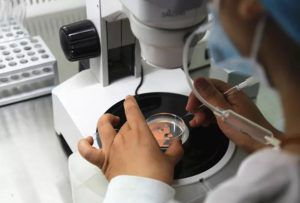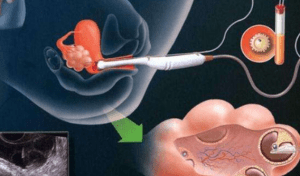MerryLife would like to tell you something: if you are thinking about going to Kyrgyzstan for IVF, don't just think "it's just a medical program anyway". Because IVF is never just a medical procedure, it's more of a physical and mental battle, a life overhaul.
A lot of people think that doing IVF is just a matter of a doctor taking care of fertilization for you in a lab, putting the embryos back in, and that's it. But what's the reality? Along the way, there are long hours of time consuming, all kinds of physical conditions, emotional roller coasters, and the most torturous waiting period, especially the days of waiting for the HCG check, which are like years and years.
But then again, why are so many people still willing to go? Because there are really quite a few advantages there, such asIVF is inexpensive, highly skilled, gender-selective, and can be performedLegal SurrogacyIf you're planning on going down this road, ...... is a good way to try it out, but you have to realize that it's not "easy, easy, easy, easy, easy".
That's why I'm writing this article to put in front of you the pitfalls that many people "don't realize until they're halfway there," such as:
- How time consuming is IVF?
- Getting your own shots sounds scary, what's actually going on?
- Does egg retrieval hurt?
- Should I give up in case I fail the first time?
After all, IVF is not simply a medical program, but a major choice that touches lives, emotions, relationships and even finances.

If you're planning to start this journey in Kyrgyzstan, here are 6 things you should definitely have in mind before entering the cycle, because being prepared is the only way to not suddenly crash one night or be caught off guard in the clinic.
1. Test tubes really take time
Let's start with the most realistic: test tubes are particularly time-consuming, theDon't expect a perfect pregnancy in a week or twoThe
You may have to go to the hospital every day for blood tests and ultrasounds. The first few days of injections are fine, but after a few days when the follicles grow, the monitoring will become more and more frequent, sometimes every other day. Some people even have to fly to Kyrgyzstan two or three times, or simply stay there for a while, which is very stressful for working people, especially those who have tight schedules.
Many people say that IVF is not only a physical job, but also a psychological battle. You may suddenly have to take time off work, or explain to your boss why you suddenly have so many hospital appointments; you may also have emotional ups and downs due to medication side effects, and want to cry but don't dare to.
So, if you are planning to do IVF, especially to Kyrgyzstan, you really have to think about it first:
- Can I free up my time?
- Will the unit understand my frequent vacations?
- Can I live with this rhythm being completely disrupted?
It's not to scare you, but many people get halfway through the process and realize they've been caught off guard by life backfiring on them.

2. A strong "jury" is really important.
This whole test tube thing is, at the end of the day, too much pain to fight alone.
Everyone is in a different place when it comes to IVF, but the one thing in common is that it's a journey that can be extremely anxiety-provoking and even lonely. Not only do you have to deal with physical discomfort and emotional ups and downs, but you also have to be on your guard against any expectations of results that may not be realized.
Especially in foreign countries where you may not even speak the language and the cultural environment is unfamiliar. The feeling of loneliness is often magnified to the maximum.
So, I truly recommend that even if you're independent, you build your "jury" ahead of time:
- A partner must come alongside you on this journey, not just to run with you to the hospital, but to pull you along when you break down.
- Friends, family, even if they don't know about IVF, can be an outlet for your emotions. It's important to be able to talk, even if it's just to talk.
- Don't be afraid to seek professional psychological support if you really don't feel up to it.
Don't feel like you have to be "tough as nails". The biggest fear of IVF is falling into a black hole alone at the moment of emotional breakdown.
3. your body, may feel some side effects
Many people worry about whether it will hurt or not before they undergo IVF, but in fact, what is more testing is the various small conditions of the body.
Doctors in Kyrgyzstan for IVF usually prescribe medications to stimulate ovulation, in order to increase the growth of follicles in the ovaries. However, as soon as the hormones come up, the body may start to "play tricks":
- Some people may feel their stomachs rise up like a drum and even change their pants to a larger size.
- Some people can become particularly emotional, wanting to cry one minute and be cranky the next.
- Others may feel breast tenderness, dizziness and nausea, like a supercharged version of PMS.
These are not uncommon, and most are drug effects, rarely to the point of being life-threatening. However, if you feel that the symptoms are particularly severe, such as difficulty breathing or ascites, it's important to get to a doctor quickly.
The body reacts differently for everyone. All you have to do is know ahead of time that these things can happen and tell yourself - "It's not that I'm too fragile, it's just a regular side effect of IVF."
4. Give yourself a shot? It's not as scary as you think.
Many people turn white when they hear "do it yourself".
I get it. It does seem a little scary to imagine yourself taking a needle and poking it into your belly. But in reality, the vast majority of fertility drugs are injected subcutaneously with a needle so fine, like an insulin needle, that the pain is almost negligible.
Moreover, in most fertility clinics in Kyrgyzstan, you will be patiently taught how to give injections. Sometimes the nurse will even demonstrate it herself. It's really quite simple:
- Wipe clean with alcohol pads
- Pinch up the skin
- Stick it in. Push the potion.
- Pull out the needle. Done.
Many people even practice until they can fight with their eyes closed. Too scared to do so? Then ask your partner for help, or get assistance from a local nurse.
Don't let this little stitch put you off. You will be stronger than you think.
5. Egg retrieval sounds scary, but it doesn't really hurt.
The most dreaded part of the procedure for many people is the "egg retrieval". Imagining a needle being stuck into your ovaries sends chills down your spine.
But let me be fair: egg retrieval really isn't as scary as you think.

With IVF in Kyrgyzstan, the egg retrieval procedure is usually done under sedation or anesthesia throughout, and you basically sleep through it. The doctor extracts the eggs from the follicles with a fine needle under ultrasound guidance, and the whole process takes only twenty minutes.
You may wake up feeling mild abdominal soreness, as if you have menstrual pains, just walk slower and the vast majority of people return to their daily lives the next day.
Of course, some people may feel more bloated or in pain, so rest, drink plenty of water, and your doctor will help you. You really don't need to be so nervous that you can't sleep when you hear "egg retrieval".
6. It may not work all at once, be prepared for it
Finally, a bit of truth that many people don't want to hear, but must face: with IVF, it's not a one-time deal.
Many people get pregnant on the first try, and that's certainly best. But there are quite a few that take a second, third, or even more rounds of trying. It's not bad luck, it's reality.
There are so many factors that affect IVF success rates:
- Age (large difference in success rates between pre-35 and post-40)
- ovarian reserve
- sperm quality
- Chromosome status of the embryo
- uterine environment
Even if the embryos are transferred back, it is not 100% likely that the embryos will be implanted. Usually it takes 9-11 days after the transfer to check the blood to see if the hCG is elevated. Those days are the hardest, and many people will speculate over and over again whether they are pregnant or not, and will be on edge every time they go to the bathroom.
So, I'd like to say one thing in particular:Even if you fail the first time, it doesn't mean there's no hope for the future.IVF is just that, it takes persistence and mindfulness. Never blame yourself for failure, and never get caught up in self-doubt.
put at the end
I have written all this not to scare you, but to put these realities in your mind before you embark on the IVF path in Kyrgyzstan. That way, if you are faced with a challenge, at least you won't be devastated because you "didn't see it coming".
If you decide to go down this road, may you find doctors you can trust, and may you have someone by your side to gently pat you on the back when you're anxious or tired and say, "It's okay, we're in this together."
After all, IVF is more than just medicine, it's a bridge to a dream.MerryLife wishes you all the best and everything you wish for.






